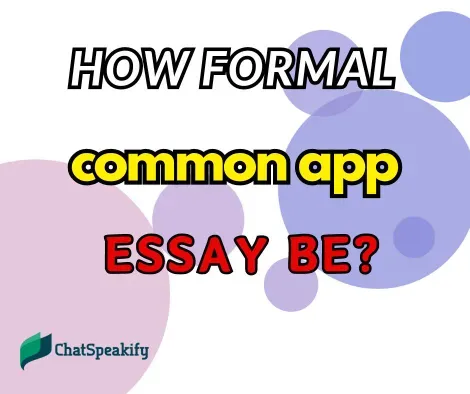Introduction: Striking the Right Balance
The Common App essay is a pivotal component of your college application, giving you the opportunity to showcase your personality, experiences, and writing skills. One common question applicants face is: How formal should my essay be? Striking the right balance between formality and authenticity is key. Let’s explore how to navigate this aspect of your Common App essay.
Understanding the Audience
Admissions Officers as Readers
Remember, admissions officers read thousands of essays. They are looking for genuine, insightful, and well-crafted essays that reflect who you are. While the essay should be polished and free of errors, it should also convey your unique voice.
Tone and Style
-
Professional but Personal: Aim for a tone that is professional yet personal. Your essay should reflect your individuality and be engaging, but avoid being too casual or colloquial.
-
Respectful and Thoughtful: Maintain a respectful and thoughtful tone, especially when discussing sensitive or personal topics.
Formality Guidelines
Language and Diction
-
Appropriate Vocabulary: Use a vocabulary that is appropriate for a college essay. Avoid slang and overly casual language, but don’t feel pressured to use overly complex words that don’t fit your natural writing style.
-
Clarity and Precision: Be clear and precise in your language. This makes your essay easier to read and understand.
Structure and Format
-
Standard Essay Format: Use a standard essay format with an introduction, body paragraphs, and a conclusion. This helps organize your thoughts and presents them coherently.
-
Transitions and Flow: Use transitions to ensure your essay flows smoothly from one idea to the next. This adds to the professionalism and readability of your essay.
Personal Voice and Authenticity
-
Be Yourself: While maintaining a level of formality, make sure your personality shines through. Your essay should sound like you.
-
Share Your Story: Admissions officers want to learn about you. Share your experiences and insights authentically.
Examples of Formality Levels
Too Casual
Example: “So, I was like super nervous when I got up on stage. It was kinda a big deal for me.”
- Why It’s Too Casual: The use of slang (“like,” “super nervous,” “kinda”) and informal language makes this too casual for a college application essay.
Too Formal
Example: “Upon ascending the platform, an overwhelming sense of trepidation besieged my being, rendering the moment an immense challenge.”
- Why It’s Too Formal: The overly complex vocabulary and convoluted sentence structure can make the essay difficult to read and may come off as inauthentic.
Just Right
Example: “As I walked onto the stage, my heart pounded in my chest. This was a pivotal moment for me, and I felt both excited and nervous.”
- Why It’s Just Right: This example uses clear, precise language and maintains a professional tone while still conveying personal emotions and experiences.
Balancing Formality with Personal Touch
Show, Don’t Just Tell
Use descriptive language to paint a picture of your experiences, but keep it relatable and genuine.
- Example: “The butterflies in my stomach felt like a storm as I stepped onto the stage. I took a deep breath, reminded myself of all the practice, and began to speak.”
Be Reflective
Reflect on your experiences and what they have taught you. This adds depth to your essay and demonstrates maturity.
- Example: “This experience taught me the importance of resilience. Despite my initial fear, I learned that pushing through challenges can lead to personal growth and unexpected rewards.”
Conclusion: Finding Your Voice
The Common App essay should be formal enough to reflect your seriousness about the application process, yet personal enough to show who you are. Aim for a balanced tone that is professional, clear, and reflective of your unique voice. By carefully considering your language and style, you can craft an essay that stands out for the right reasons.
Final Tips
-
Proofread: Ensure your essay is free of grammatical errors and typos.
-
Seek Feedback: Have teachers, mentors, or trusted friends review your essay to ensure it strikes the right tone.
-
Revise: Be prepared to revise multiple times to achieve the perfect balance.
References
-
The Common Application. (2023). Essay Prompts.
-
Purdue Online Writing Lab. (2023). Writing the Personal Statement.
